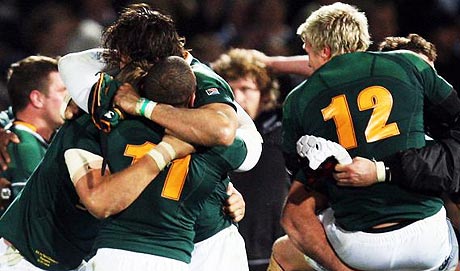
Australia and South Africa are under an obligation to produce a spectacle in tomorrow's third round of the Tri-Nations championship in Perth following John O'Neill's dismissal of European rugby this week as a penalty shoot-out.
O'Neill, the Australian Rugby Union's excitable chief executive, was at his belligerent best after discovering that three of the more undesirable experimental law variations, all of which encourage a proliferation of free-kicks, will not be trialled in Europe next season, making their permanent inclusion in the law book next year thankfully unlikely.
He warned of a split between the hemispheres, with the south adopting the variations in full regardless of the majority vote, leaving the European unions to consider whether their game would be as commercially strong without Australia, New Zealand and South Africa to play. The ELV debate, he argued, was a no-brainer: who would not prefer a fast, fluid game to a stop-start version that was subservient to the complexities of the law-book?
O'Neill got carried away because he compared, unfavourably, the opening two "wonderful" matches of the Tri-Nations between New Zealand and South Africa played under the ELVs, with the tour matches in the southern hemisphere in the previous few weeks which were played under the old rules.
The evidence confounded, rather than supported, his theory, but the argument over the variations has gone beyond the boundary of how the game should be played. O'Neill showed merely how desperate is his need for change: defence triumphed over attack in Dunedin last Saturday, even allowing for the fact that South Africa outscored New Zealand by two tries to one.
O'Neill should have directed his ire at his compatriot, the referee Matt Goddard, who awarded a rash of free-kicks early on for offences at the breakdown, most of them to the All Blacks. But they were not allowed to take them quickly, so polluting the essence of the variations, because the official insisted on telling each miscreant why he had been penalised.
The two matches were absorbing, intense affairs, but they were not especially distinctive. What they did confirm was that too much possession can be a dangerous thing. New Zealand had the bulk of the ball but created little: aimless kicking and passing abounded, only serving to emphasise the impact the variations are likely to have eventually, motion eclipsing thought; sanctuary for the brainless.
Australia are likely to be cagier tomorrow than New Zealand were in Carisbrook. Despite home advantage, the Wallabies will not go into the match as favourites given the respective form of the countries in the last year and a lack of evidence about the impact Robbie Deans has made on the Wallabies: their three matches under his charge have been played under the old laws, two against an under-strength France, but time has clearly been spent on the set-pieces and in Matt Giteau they have an outside-half with a creative touch, while Luke Burgess is a find at scrum-half.
Last weekend vindicated South Africa's argument that, despite avoiding most of the leading nations on their way to winning last year's World Cup, they were worthy champions. They confined New Zealand to two tries in two matches, profiting from the absence of Richie McCaw, but head coach Peter de Villiers is looking for his players to take more of the initiative tomorrow.
He has made three attacking changes, bringing in Conrad Jantjes and Francois Steyn to the back division with Pierre Spies replacing Joe van Niekerk at No8, wanting his players to build on strong defensive foundations. Deans has opted for experience, bringing back Lote Tuqiri, Wycliffe Palu and Nathan Sharpe.
Despite O'Neill's ranting, Deans would take the dullest of victories in his first international as a coach, building up to later meetings with his native New Zealand. Winning ugly did de Villiers no harm last week and there lies the dilemma for the ARU chief executive: the union will ultimately judge Deans by results, not style.
There were many who felt that Deans should have taken over from the All Blacks' coach Graham Henry after last year's World Cup. New Zealand had shown that it did not require law change to inspire a positive intent, but defence tends to win World Cups.
O'Neill is seeing things in simple terms, a fight between good and evil. The Springboks last week looked little different to the side that won the World Cup. Laws may change but principles remain. Sport should be about difference and clashes of cultures, not homogeneity.

